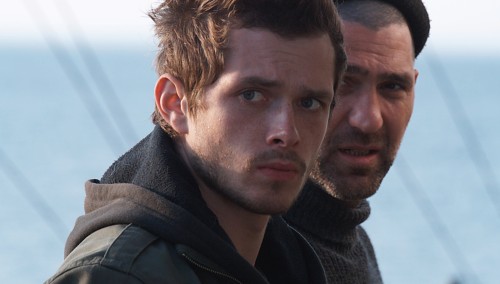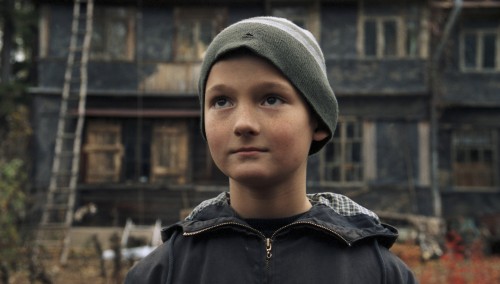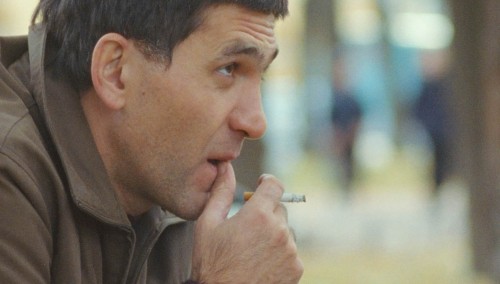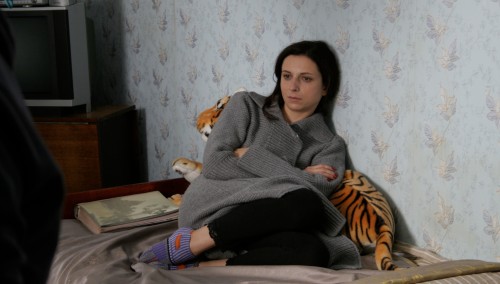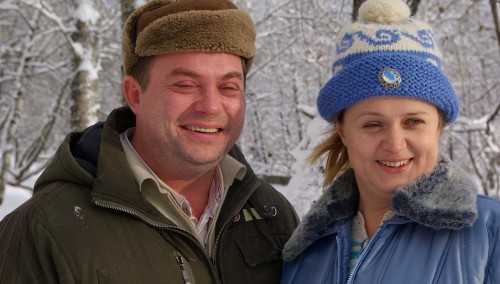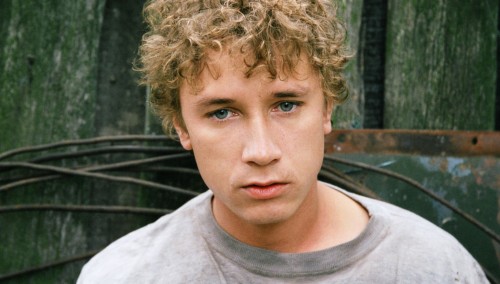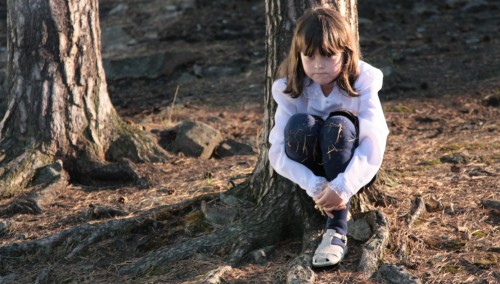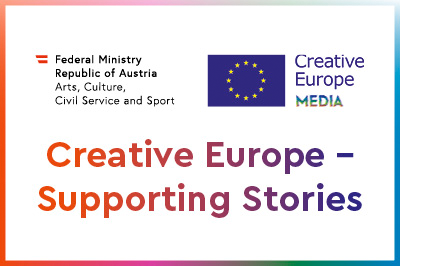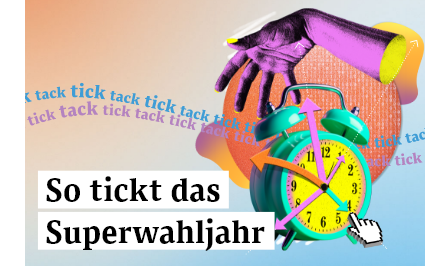Biography
Roman Borisevich, born March 13, 1975. Graduated 1997 from the Faculty of Economics at the University of Moscow with an emphasis on food production. After that, he studied for two years at the Economic Faculty of the Moscow Film Academy “VGIK”. Since 1999 he has been working as an independent producer, in 2000 he founded the distribution company “CineMAX”. Also that year, he produced the comedy Lit so Frantsuzskoy Natsionalnosti (2000) about a Georgian prison escapee, who the people of a village near the prison mistake for the new French teacher. In 2003 – together with Boris Khlebnikov and Alexei Popogrebsky – he initiated the production company “Koktebel Film”. Recently he finished working on Kak ya provel eti m let om (How I Ended This Summer), Popogrebsky‘s latest film.

Boris Khlebnikov, born August 28, 1972 in Moscow. Took biology classes for two years before beginning to study film theory at the Moscow Film Academy VGIK. Graduated in 1997. In the same year, together with Alexei Popogrebsky, he made the two minute documentary Mimokh od (Passing By,1997). Following the international success of Koktebel (2003), together with Popogrebsky and Borisevich he founded the film production company Koktebel Film and continued his career as a director with the solo work Svobodnoe plavanie (2006). He recently contributed the episode Infamy to the omnibus film Korotkoe zamykanie (2009), in which five internationally recognized young Russian filmmakers reflect on the theme of “love”. Khlebnikov’s contribution focuses on the ambivalent relationship of a young journalist working in a dilapidated housing development to his neighbor.

Nikolay Khomeriki, born April 17, 1975. Studied business administration, then worked for the Russian branch of Coca Cola and was awarded a place for an elite course of study in the Netherlands. In Amsterdam he lived very near to an art house videotheque, which aroused his interest in international classic films. He dropped his studies, returned to Moscow and applied for the “Higher Courses for Directing and Screenplay”, where he studied until 2000, learning directing from Alexey German, Vladimir Khotinenko, Vladimir Menshov, and others. Following that, he continued his training at the Paris Film Academy “La Fémis”. In 2004 he worked as assistant director on Phillippe Garrel’s Les amants réguliers (Regular Lovers, 2005). Since 2005 he has been making films in Russia again. Three of his works (Vdvoyom [Cinéfondation], 977 and Skazka pro temnotu [Un certain régard]) premiered at the film festival in Cannes.

Alexei Popogrebsky, born August 7, 1972 in Moscow. Studied psychology at the University of Moscow and initially lived primarily from translation work. While he was studying, he became acquainted with Boris Khlebnikov. Together they made the documentary film Mimokh od in 1994. After that, he was responsible for editing Khlebnikov’s short film Xitraja Ljaguška. Their first joint feature film Kokte bel was awarded numerous international prizes. In 2003, together with Khlebnikov, he founded the film production company “Koktebel Film”, which produces their own work and films by other young directors. In 2008 he made two episodes for the TV series “Sudebnaya Kolonka”. His new film Kak ya provel etim letom (How I Ended This Summer) premiered at the Berlinale 2010 and received two Silver Bears.

Vassily Sigarev, born 1977 in Nizhny Tagil in the Middle Urals, lives in Yekaterinburg. The dramatist comes from the school of Nikolai Kolyada, who in his works mostly describes marginal social existence. Sigarev also became known with a similar theme: with “Plasticine”, a play about street children that was found offensive when it premiered in Russia and received its international premiere in 2002 at the London Royal Court Theatre, he became the first non-English-speaking dramatist to receive the “Evening Standard Theatre Award” as “Most Promising Playwright”. British theater critics see Sigarev in the tradition of the provocative “in-yer-face theatre”. He has written eighteen plays, almost all of which have been performed throughout Europe, and some of which have been translated into German (“Plastilin“, “Ladybird“, “Schwarze Milch“, “Nachtschicht“). At the Moscow Art Theatre he dramatized Patrick Süskind’s “Perfume“. For his first work as a film director, Sigarev adapted his own play “Wolfy”. The film was awarded as Best Film at the “Kinotavr” film festival in Sochi in 2009 and also received the prize for Best Script. It premiered internationally at the Karlovy Vary Int.Film Festival in 2009.

Essay
On the Power of Chance
by Bernd Buder
In 2009, the Moscow film production company ‘Koktebel Film’ was represented at the national film festival in Sochi with three works. Vassily Sigarev’s Wolfy (Volchok) was awarded as the best Russian film. Alexei Popogrebsky, one of the founders of the company, describes that year as a breakthrough for his generation of filmmakers: “Their films were very different in style, all imperfect in one way or another. Yet, there was something common about them: the sense of something unwell brooding under the surface of increasing stability and prosperity.”1 ‘Koktebel Film’ has meanwhile become one of the most influential production companies in Russian art house cinema, and Popogrebsky’s latest work How I Ended Th s Summer (Kak ya provel etim letom) was shown this year in the Berlinale Competition and awarded with two Silver Bears. The ‘Koktebel’ directors focus on life beyond the glittering metropolis, an everyday life that barely leaves room for dreams. With their blend of laconic portraits, surreal humor and meditative seriousness, time and again they draw glimmers of hope from the shadowy worlds of ordinary people with their subdued ‘happy ends’.
In 2003 Khlebnikov and Popogrebsky presented their first feature film, Kokte bel. A father and his son travel initially by train, then by foot and hitch-hiking from Moscow to the coastal town of Koktebel on the Crimean peninsula. In between are 4000 kilometers of landscape, in which they get lost, grow apart, and finally come together again, as changed persons. The journey is determined by chance occurrences, which the protagonists choose for themselves: here the teetotaler’s fatal reach for the bottle, there the lover, in whose house the journey comes to a halt, angering the son who goes on alone. It is a kind of drifting that provided the title for Khlebnikov’s first solo work as a director: Free Floating (Svobodno Plavanie, 2006) portrays a teenage casual worker, who makes his way through life in a provincial town on the Volga River – between unfulfilled love affairs and half-baked jobs, between longing and resignation kept under control by nonchalant pragmatism.
At the same time, the dialogues are reduced, while the camera signals the principle of hope with long shots. Even in the interiors, symbols of the proverbial constraints of catharsis, there is a palpable lightness that is coupled with psychological depth to illuminate the depths of the soul. The subsequent films from ‘Koktebel’ film production, founded jointly in 2003 by the two filmmakers and their producer Roman Borisevich, also show the ups and downs of self-discovery. The backdrop to this search for meaning are the plains of the Russian province, which always look so much the same that the gaze necessarily clings to details, and are so flat that the soul has to invent its own highs and lows.
In the course of this they keep coming back to the detail, describing the impact of chance as the individual’s way of taking control: “Life, as it happens around us, consists of a myriad of tiny occurrences, which sometimes tell more than the most dramatic of events. At any given moment, it is up to us to observe and take note of them, or to let them stay outside of the scope of our attention. We felt that ... we needed to create space on the screen where such details and occurrences would unfold in the most natural way.”2 The open end at the conclusion promises modest assurance: the grown-up boy’s view of the open sea at the pier of Koktebel, the walk in the park with children in Simple Thi ngs (Prostye veshchi), the snowfall at Zhenya‘s return to his Belarussian home village in Help Gone Mad (Sumasshedshaya pomosh).
Khlebnikov emphasizes this immanent lightness when he pointedly distances himself from zealots seeking to impose messages on others with their art: “I have no great vision. I don’t want to lecture anyone. When Tolstoy wrote his ‘Sevastopol Sketches’, he behaved like a satisfied officer. He had been drinking, gave himself to idleness. At the end of his life, though, he felt like a Messiah and became a terrible guy who ran around barefoot and wanted to lecture others. A serial killer who has decided to kill all blondes with breast size 4 and people who want to make other people better are very similar.”3 He wants his most recent feature film Help Gone Mad to be seen as a “tragicomedy” which also includes elements of Russian folk tale and farce. The ‘Koktebel’ films are thus always adventure stories, portraits of the country and – mostly ordinary – people.
In search of atmospheres and locations for Kokte bel, Khlebnikov and Popogrebsky, along with their cameraman Shandor Berkeshi, set out three times on the 4,000-kilometer journey from Moscow to the seaside resort on the Crimean peninsula. On the impact of the documentary on their feature film, they say, “We called it ‘the forgotten camera’, whereby we would use a lot of static, non-intrusive shots, within which life would sort of originate independently, like it sometimes does in documentaries.”4 As an example they cite the film Hush! (Tishe!) by Victor Kossakovsky, which was released in 2003. Prior to the feature film, they made the documentary He‘s Gone (Uyekhal) about a Belarussian guest worker in Moscow. Filmmaker Valeriya Gai Germanika was engaged as camera woman for the production. In her documentary films Girls and Boys in 2005 and 2007, she had already observed the everyday life of underprivileged teenagers in Moscow in the authentic, disturbing tradition of ‘direct cinema’.
With the influence of the documentary, social critique comes in through the back door. The minor heroes in the ‘Koktebel’ films, often loafers against their will, do not simply let their spirits float in the vastness of the Russian province, but are also caught between the remnants of socialism and the rudiments of capitalism. One of Khlebnikov’s favorite films is Pyotr Buslov‘s Boomer (Bumer, 2003), a black comedy about the financial prospects and the compulsion in Yeltsin era‘s Russia to engage in dirty little deals to survive. Sigarev became known as a theater director, with plays about street children and other marginal figures of society. Popogrebsky mentions points of contact with ‘New Drama’, of which one of the central figures is Aleksandr Rodionov, who contributed the script to two films by Khlebnikov and Tale in the Darkness (Skazka per temnotu): “There is one strong connection shared by Boris [Khlebnikov], Nikolay [Khomeriki] and especially Vassily Sigarev. It is the New Drama movement, taking shape over the last decadeand- a-half in Russian theater. Often raw and brutal, it borrows themes, characters and sometimes all dialogs from real life. It looks at people outside metropolia, at life beyond the circle of prosperity chase.”5 Perhaps this is one of the reasons why none of the ‘Koktebel’ films were shot in Moscow – even Help Gone Mad was not shot in the Russian capital, but in Yaroslavl.
The playwright Sigarev, like the psychologist Popogrebsky, the biologist Khlebnikov, the food economist Borisevich and the business economist Nikolay Khomeriki, comes to film from a different field. Nobody from the ‘Koktebel’ core team initially aspired to a film career, and only Khomeriki has a formal degree as a filmmaker. The power of chance, it seems, is a fundamental principle not only in film. Khomeriki recounts how during his economics studies in the Netherlands he moved from “boring” Maastricht to Amsterdam, where he discovered an art house videotheque in his neighborhood, and with it his love for cinema. When he talks about that time, zapping through European classic films, a distance to the moral symbolism in his home country is evident: “Of course I was impressed by Stalke r, but I was also impressed by the lightness of the French ‘Nouvelle Vague’ and by German films. In Russia, Fassbinder is not considered a classic filmmaker, only because he made two films a year. For our Eastern school that is not monumental enough.”6
In Western countries, on the other hand, clichés are made use of over and over to be able to classify the ‘Koktebel’ films. Koktebel thus has to put up with the Tarkovsky parallel, and the name Aki Kaurismäki is repeatedly heard in conjunction with Help Gone Mad. Popogrebsky, who considers Alexey German sr. and Otar Iosseliani among the most important directors, rejects these kinds of comparisons: “[Kaurismäki] has always been one of most important directors for Boris Khlebnikov, and I have immensely enjoyed his films. However, what I confidently claim is that there are absolutely no intentional influences of his style in any of our films. Frankly, even when you are compared to your favorite director, it is not very pleasant. When somebody says that Koktebel is reminiscent of Tarkovsky, I shudder. I think that whatever type of film you make, if you are from Russia, first thing that always comes to the mind of the Western audiences is Tarkovsky.”7 Rather sarcastically Popogrebsky comments on the second major misconception in the Western perception of Russian cinema: “One thing that I can’t help noticing is the willingness of Western audiences to look for political implications in film, sometimes even where they are absent. At his return from Berlin Boris told me that one of the questions from the audience was whether it was intentional that the police officer resembled the previous President of Russia, and the man in the railroad car looked like the current President. I laughed. Now, whenever I see Igor Chernevich, who played Father in Koktebel and the policeman in Help Gone Mad, I desperately look for traits of Yeltsin, and frankly, the General Director of Koktebel Film Company, who in Boris’s film brilliantly portrayed the man in the car, and played the assistant to the New Russian in Simple Things, is as much a Putin lookalike as I am Mao’s.”8
1 Alexei Popogrebsky, e-mail-Interview vom 17.1.2010. Originalzitat Englisch: “For the first time, I felt that there is a new generation that came to force within the industry. Their films were very different in style, all imperfect in one way or another. Yet, there was something common about them: the sense of something unwell brooding under the surface of increasing stability and prosperity (all of these films were shot before the 2008 worldwide financial crisis, that affected Russia badly).” Alexei Popogrebsky, email interview from 17 January 2010.
2 Originalzitat Englisch: “Life, as it happens around us, consists of a myriad of tiny occurances, which sometimes tell more than the most dramatic of events. At any given moment, it is up to us to observe and take note of them, or to let them stay outside of the scope of our attention. We felt that ... we needed to create space on the screen where such details and occurences would unfold in the most natural way.“ Quelle: Berlinale - Internationales Forum des Jungen Films, Festivalkatalog 2004, S. 109 Berlinale - Internationales Forum des Jungen Films, Festival catalogue 2004, p. 109
3 Zit. n. Webseite www.koktebelfilm.ru // Quoted from the website: www.koktebelfilm.ru
4 Originalzitat Englisch: “We called it the forgotten camera‘, whereby we would use a lot of static, non-intrusive shots, within which life would sort of originate independently, like it sometimes does in documentaries.“ Quelle: Berlinale - Internationales Forum des Jungen Films, Festivalkatalog 2004, S. 109 Berlinale - Internationales Forum des Jungen Films, Festival catalogue 2004, p. 109
5 Alexei Popogrebsky, e-mail-Interview vom 17.1.2010. Originalzitat Englisch: “There is one strong connection shared by Boris, Nikolay and especially Vassily Sigarev. It is the New Drama movement, taking shape over the last decade-and-a-half in Russian theater. Often raw and brutal, it borrows themes, characters and sometimes all dialogs from real life. It looks at people outside metropolia, at life beyond the circle of prosperity chase.“ Alexei Popogrebsky, email interview from 17 January 2010.
6 Zit. n. Webseite www.koktebelfilm.ru // Quoted from the web site www.koktebelfilm.ru
7 Alexei Popogrebsky, e-mail-Interview vom 17.1.2010; Originalzitat Englisch: “[Kaurismäki] has always been one of most important directors for Boris Khlebnikov, and I have immensely enjoyed his films. However, what I confidently claim is that there are absolutely no intentional influences of his style in any of our films. Frankly, even when you are compared to your favorite director, it is not very pleasant. When somebody says that Koktebel is reminiscent of Tarkovsky, I shudder. I think that whatever type of film you make, if you are from Russia, first thing that always comes to the mind of the Western audience is Tarkovsky.“ Alexei Popogrebsky, email interview from 17 January 2010
8 Alexei Popogrebsky, e-mail-Interview vom 17.1.2010; Originalzitat Englisch: “One thing that I can‘t help noticing is the willingness of Western audiences to look for political implications in film, sometimes even where they are absent. At his return from Berlin Boris told me that one of the questions from the audience was whether it was intentional that the police officer resembled the previous President of Russia, and the man in the railroad car looked like the current President. I laughed. Now, whenever I see Igor Chernevich, who played Father in Koktebel and the policeman in Help Gone Mad, I desperately look for traits of Yeltsin, and frankly, the General Director of Koktebel Film Company, who in Boris‘s film brilliantly portrayed the man in the car, and played the assistant to the New Russian in Simple Things, is as much a Putin lookalike as I am Mao‘s.“ Alexei Popogrebsky, email interview from 17 January 2010

